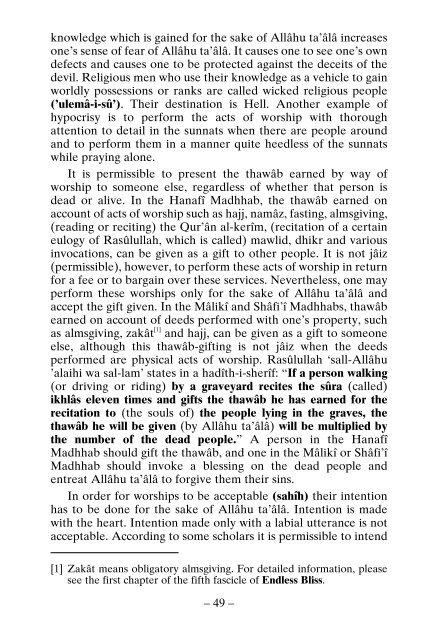Ethics of Islam
Ethics of Islam is taken from the book Berîka by Muhammad Hâdimi. Immorality and ways to get rid of it; 40 depravities and cures to them; usefulness of ethics; what is a soul; strengths of a soul; Personalities emanating from wisdom, courage, chastity and justice are extensively explained.
Ethics of Islam is taken from the book Berîka by Muhammad Hâdimi. Immorality and ways to get rid of it; 40 depravities and cures to them; usefulness of ethics; what is a soul; strengths of a soul; Personalities emanating from wisdom, courage, chastity and justice are extensively explained.
Create successful ePaper yourself
Turn your PDF publications into a flip-book with our unique Google optimized e-Paper software.
knowledge which is gained for the sake <strong>of</strong> Allâhu ta’âlâ increases<br />
one’s sense <strong>of</strong> fear <strong>of</strong> Allâhu ta’âlâ. It causes one to see one’s own<br />
defects and causes one to be protected against the deceits <strong>of</strong> the<br />
devil. Religious men who use their knowledge as a vehicle to gain<br />
worldly possessions or ranks are called wicked religious people<br />
(’ulemâ-i-sû’). Their destination is Hell. Another example <strong>of</strong><br />
hypocrisy is to perform the acts <strong>of</strong> worship with thorough<br />
attention to detail in the sunnats when there are people around<br />
and to perform them in a manner quite heedless <strong>of</strong> the sunnats<br />
while praying alone.<br />
It is permissible to present the thawâb earned by way <strong>of</strong><br />
worship to someone else, regardless <strong>of</strong> whether that person is<br />
dead or alive. In the Hanafî Madhhab, the thawâb earned on<br />
account <strong>of</strong> acts <strong>of</strong> worship such as hajj, namâz, fasting, almsgiving,<br />
(reading or reciting) the Qur’ân al-kerîm, (recitation <strong>of</strong> a certain<br />
eulogy <strong>of</strong> Rasûlullah, which is called) mawlid, dhikr and various<br />
invocations, can be given as a gift to other people. It is not jâiz<br />
(permissible), however, to perform these acts <strong>of</strong> worship in return<br />
for a fee or to bargain over these services. Nevertheless, one may<br />
perform these worships only for the sake <strong>of</strong> Allâhu ta’âlâ and<br />
accept the gift given. In the Mâlikî and Shâfi’î Madhhabs, thawâb<br />
earned on account <strong>of</strong> deeds performed with one’s property, such<br />
as almsgiving, zakât [1] and hajj, can be given as a gift to someone<br />
else, although this thawâb-gifting is not jâiz when the deeds<br />
performed are physical acts <strong>of</strong> worship. Rasûlullah ‘sall-Allâhu<br />
’alaihi wa sal-lam’ states in a hadîth-i-sherîf: “If a person walking<br />
(or driving or riding) by a graveyard recites the sûra (called)<br />
ikhlâs eleven times and gifts the thawâb he has earned for the<br />
recitation to (the souls <strong>of</strong>) the people lying in the graves, the<br />
thawâb he will be given (by Allâhu ta’âlâ) will be multiplied by<br />
the number <strong>of</strong> the dead people.” A person in the Hanafî<br />
Madhhab should gift the thawâb, and one in the Mâlikî or Shâfi’î<br />
Madhhab should invoke a blessing on the dead people and<br />
entreat Allâhu ta’âlâ to forgive them their sins.<br />
In order for worships to be acceptable (sahîh) their intention<br />
has to be done for the sake <strong>of</strong> Allâhu ta’âlâ. Intention is made<br />
with the heart. Intention made only with a labial utterance is not<br />
acceptable. According to some scholars it is permissible to intend<br />
[1] Zakât means obligatory almsgiving. For detailed information, please<br />
see the first chapter <strong>of</strong> the fifth fascicle <strong>of</strong> Endless Bliss.<br />
– 49 –

















